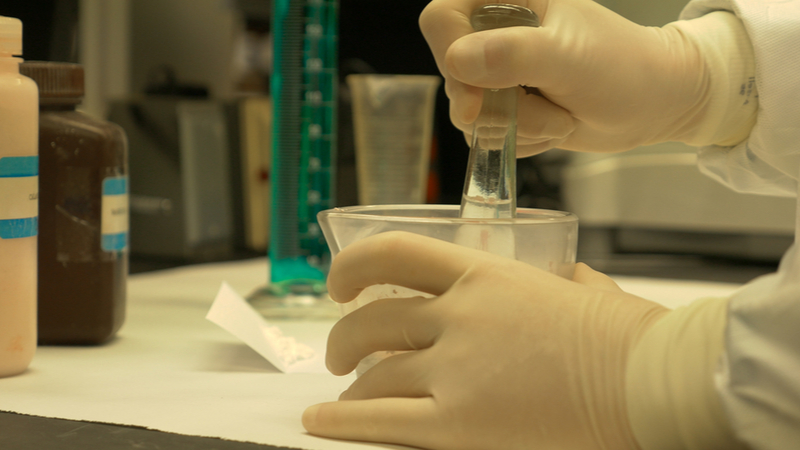As a pet owner, you’ve probably taken your pet to the veterinarian for an illness or injury. In many of these instances, your vet may have prescribed medication for the treatment of a specific ailment, so that your pet can begin the healing process.
Though some vets have an in-house pharmacy, medication is usually acquired at an off-site veterinary pharmacy. These pharmacies offer commercially formulated medication in standardized dosages that are approved by the Federal Drug Administration (FDA) for a specific disease or infection. All of these medications have undergone trials and studies to prove their effectiveness and to ensure proper dosages that are effective for a specific treatment.
However, there are times when a standardized traditional medication may not be the best choice for your pet. In these cases, when availability, dose, or delivery method don’t meet your pet’s needs, your veterinarian may recommend a compounding pharmacy.
6 Times Your Vet Will Recommend a Compounding Pharmacy
A compounding pharmacy is usually recommended when a commercially available drug doesn’t meet your pet’s specific needs.
Here are 6 instances where that might be the case:
- The standardized dose is not correct for your pet. Keep in mind that pet’s weights are vastly different, ranging from 5 lbs to over 200 lbs, with many newborn animals weighing less than a pound. Standardized dosages may be too high (and potentially toxic) or too low to be effective.
- Different species absorb and metabolize medications differently. Dogs, cats, horses, and rabbits almost always require different doses of medications, and a standardized dose may not be available in commercial form for each species.
- The taste of the medication may be too bitter for your pet, causing them to salivate or foam at the mouth.
- There are some pets you just can’t pill. It's nice when we can just hide pills in a treat or a pet will accept them directly, but that doesn’t always work or it can be stressful for the pet.
- Some pets may be allergic to the ingredients in a formulation of the medication, requiring a compounded version with different carrier ingredients.
- There are times when a human drug may be used off-label to treat your pet. Your veterinarian will explain the reasons and any concerns when using an off-label drug. These recommended drugs may need to be compounded.
The biggest difference between a compounding pharmacy and a traditional pharmacy is that compounding pharmacies buy medications in bulk. They are not packaged at standardized dosages and will be compounded to a dose and formulation to meet your pet’s needs.
Advantages of Using a Compounding Pharmacy
There are two major advantages to having a compounding pharmacy formulate a medication for your pet.
- The dose and formulation are specific to your animal.
- You can choose how the medication is delivered. Delivery can be oral or even a transdermal gel. For oral medication, you can request a capsule, taste tab, or flavored liquid. All methods are designed to help make treatment less stressful for you and your pet.
Disadvantages of Using a Compounding Pharmacy
Although there are advantages to compounding pharmacies, there are also some concerns.
Compounded medications are not FDA approved, which means their effectiveness, quality, and safety are not evaluated. Since they are not FDA approved, all compounded medications are considered off-label. Be sure to talk with your veterinarian about off-label use if you have any concerns before starting a medication.
Another concern is that medications are formulated from bulk product, so it is essential to know that the concentration and purity are accurate once compounded. Your veterinarian can help you find a compounding pharmacy that has quality control and safety measures in place and employs pharmacists that have undergone extra training on veterinary-specific medications. Pharmacists in the human medical field are not trained on veterinary medications.
Another safety precaution to check is that the compounding pharmacy has volunteered to follow strict regulations and undergo inspections by the Pharmacy Compounding Accreditation Board (PCAB). This helps ensure accuracy and quality in the compounded medication and compliance with state regulations.
Commonly Compounded Medications
Some of the most commonly compounded medications are:
- Metronidazole: This commonly used antibiotic has a very bitter aftertaste. The pill form commonly causes patients to salivate or foam at the mouth. It is typically compounded into a liquid to help hide the bitterness.
- Methimazole: Frequently used to treat hyperthyroidism in cats, this pill must be given once to twice daily depending on the treatment needed. Once diagnosed, the medication must be taken for life, thus making the daily pilling regimen difficult for cats and their owners. It is often compounded into a flavored liquid or transdermal gel.
- Prednisolone: This is a steroid that is often used to treat allergies or inflammatory bowel disease in cats. Instead of giving an oral pill, it is often compounded into a liquid, since the pills can be very small and difficult to administer and see.
Many different types of pain medications are also compounded to help ensure proper dosage.
Your veterinarian is the best person to help decide when a compounded medication is the appropriate way to treat your pet. Compounding pharmacies provide options for you to medicate your pet in a safe and effective manner, often making treatment easier or possible when a standardized commercial drug is not available.
Take some of the stress out of pet ownership with Accident & Illness Coverage from AKC Pet Insurance (underwritten by Independence American Insurance Company). Our pet insurance plans are designed to be there when you need them, allowing you to focus more on the health of your pet and less on costly veterinary bills. Click here for a quote today!


